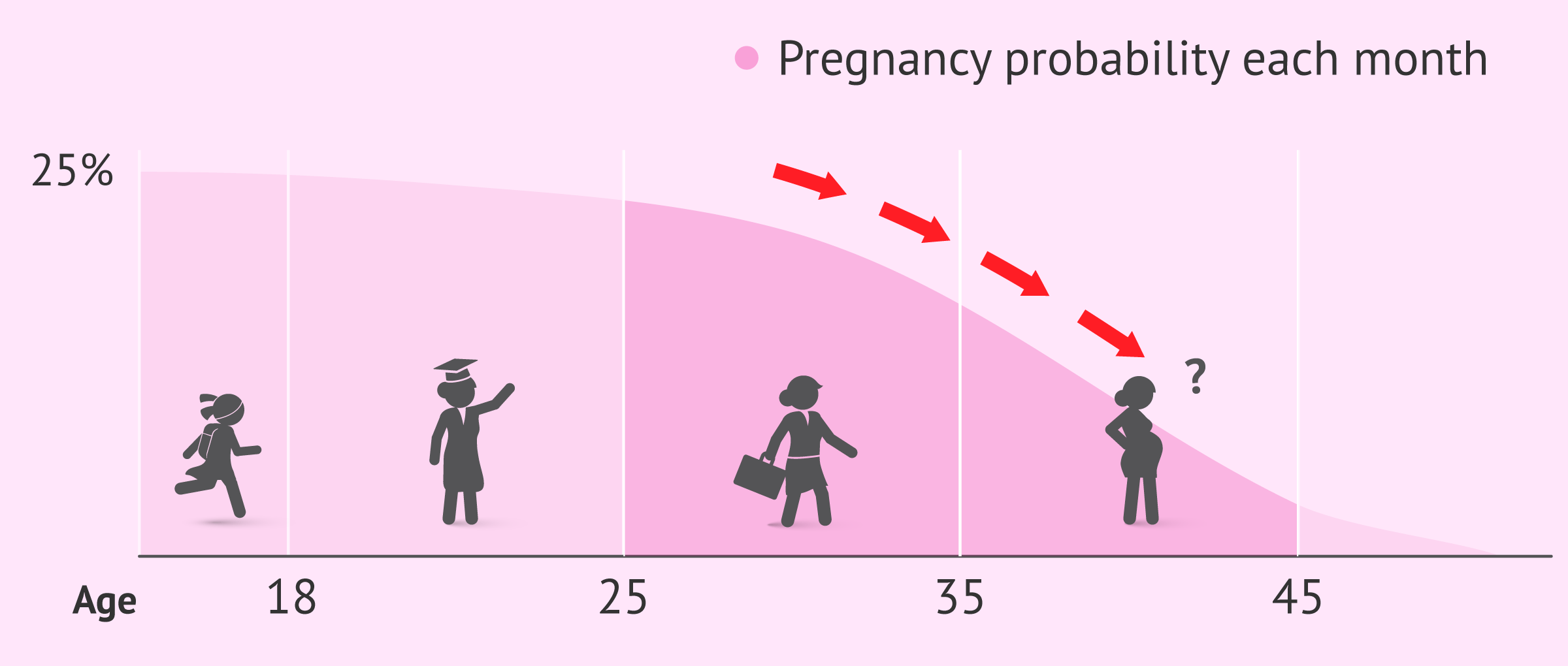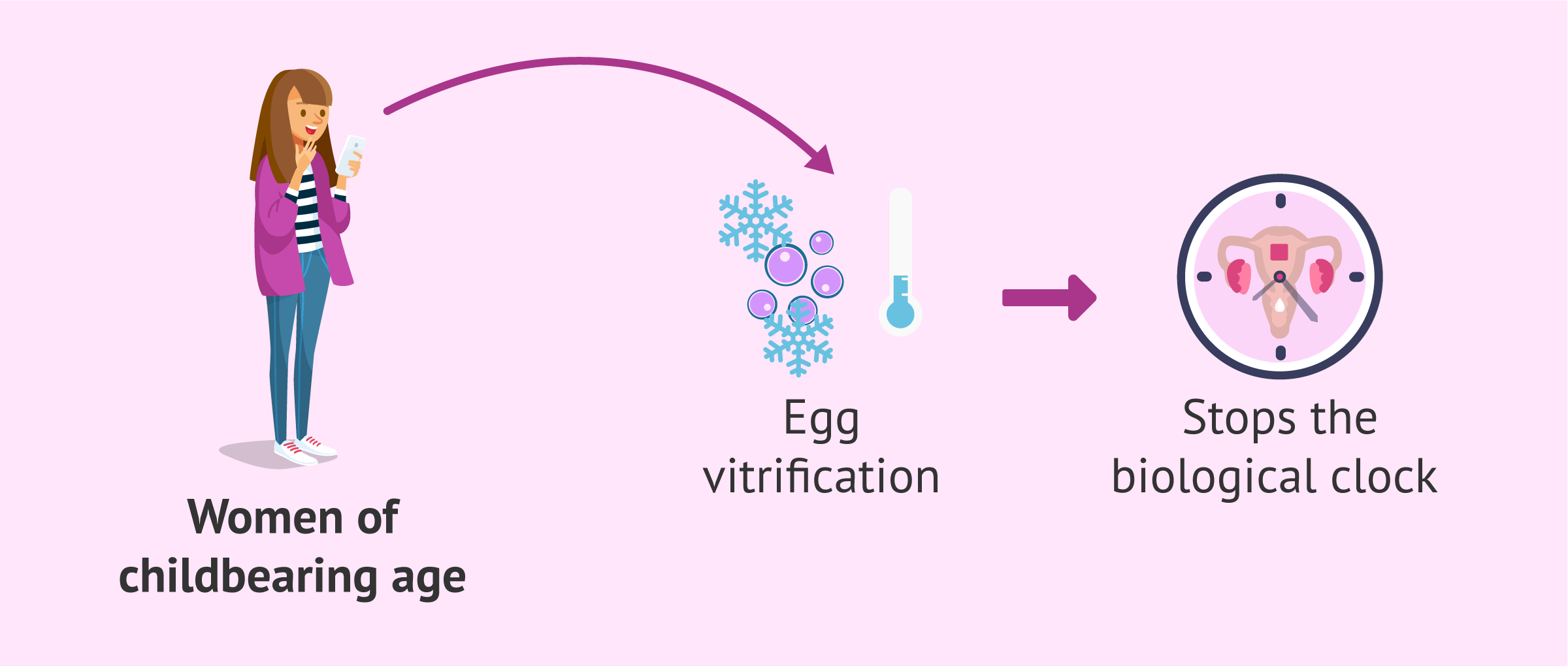Through advances in assisted reproduction, it is viable to have a child at age 40 with the same chances of pregnancy associated with a much younger age, such as 30 years of age. In this way, motherhood can be postponed without the complications that this entails thanks to the preservation of female fertility.
The assisted reproduction technique that allows this is oocyte vitrification. Women who wish to become mothers in the future can freeze their eggs, keeping their conditions intact for an unlimited time. Once women wish to become mothers, these cryopreserved eggs will be used in a fertility treatment, in vitro fertilization (IVF). This would be cheating her biological clock, which has nothing to do with her maternal instinct.
Provided below is an index with the 6 points we are going to expand on in this article.
- 1.
- 1.1.
- 2.
- 3.
- 3.1.
- 3.2.
- 3.3.
- 4.
- 5.
- 6.
What does the female biological clock refer to?
The term biological clock in women refers to the most ideal time to achieve pregnancy. Therefore, a woman's reproductive age is responsible for defining her biological clock.
However, the biological clock does not necessarily have to be synchronized with the maternal instinct, that is, with the desire to fulfill motherhood at that moment.
Each woman is born with a finite number of eggs, which gradually decreases over time. However, a woman's fertility drops drastically after the age of 35, reducing her chances of conceiving.
For this reason, women who wish to become mothers in the future, but feel that it is not yet their time, have the possibility of stopping their biological clock by preserving their eggs.
Consequences of delaying childbearing
The main disadvantage of delaying childbearing is that it is more difficult to achieve pregnancy. As we have already mentioned, it is much more complicated for a woman to become pregnant naturally after the age of 35. In addition, with each passing year, it becomes more difficult to achieve conception.
Many women in Spain are clear that they want to be mothers, but in the future. The main reasons for delaying pregnancy are:
- Improve your professional career.
- Increase your economic stability.
- Finding the right partner with whom to create a family.
- Wanting to enjoy.
It should be noted that pregnancy is a special physiological state and, therefore, it is possible that gestational complications may occur. In particular, women who become pregnant at an advanced age are at higher risk of hypertension, uterine bleeding, ectopic pregnancies and even miscarriages.
You can read more information on this topic in the following link: How does the mother's advanced age influence pregnancy?
Freezing eggs to stop the biological clock
Thanks to the vitrification of oocytes it is possible to stop time in the eggs, so that regardless of the woman's age. Your eggs are kept in the same condition as when you froze them.
There is no age limit for preserving female fertility, but it is best to do so as early as possible. It is best for women to cryopreserve their eggs before the age of 30, since this is the stage of greatest female reproductivity.
If you are considering preserving your fertility to have a baby in the future, we recommend that you start by getting a Fertility Report. In 3 simple steps, it will show you a list of clinics that fit your preferences and meet our strict quality criteria. Moreover, you will receive a report via email with useful tips to visit a fertility clinic for the first time.
Oocyte vitrification avoids having to resort to egg donation in the future, which is more expensive and also means that the woman does not pass on her genes to her offspring.
In addition to vitrification of oocytes, there is also the alternative of cryopreserving embryos. In this way, when the decision is made to have a baby, patients already know the possibilities they have.
If you would like to read more in-depth information, we suggest you visit this article: What is egg vitrification and what are its advantages.
FAQs from users
Is there a biological clock in men as in women?
The notion of a "biological clock" is a concept that has traditionally been associated primarily with women in the context of fertility, but it is important to note that men also experience changes in their fertility over time. Although these changes are not as marked as in women, there is variability in sperm quality and quantity as men age.
For women, the biological clock is directly related to the decline in ovarian reserve and egg quality with age. Women have a limited fertility window, which usually decreases significantly after the age of 35. In men, sperm production is continuous throughout life, they do not have a "reserve," but as they age, sperm quality may deteriorate, which could affect fertility.
Studies have shown that older men may experience a decrease in sperm motility and morphology, which could influence the ability to conceive. In addition, advanced paternal age has been linked to an increased risk of certain health conditions in offspring, such as autism and schizophrenia.
Sperm quality is a relevant factor to consider, especially if parenthood is delayed. Therefore, it is important for both men and women to consider their biological clock. While the concept of a "biological clock" may not be as pronounced in men as in women, age is still an important factor in male fertility and the health of offspring.
What is the ideal age to become a mother?
There is no such thing as an ideal age to become a mother. The important thing to keep in mind is that age is an essential factor for female fertility.
As a woman's age advances, her number of available eggs decreases until they are depleted. For this reason, it is often said that the best age to achieve pregnancy is between 18 and 35 years of age.
After the age of 35, many women find it difficult to conceive. In these cases, the solution would be to resort to assisted reproduction techniques.
Does age influence female fertility?
The answer is yes. As women age, changes occur in the ovaries that affect fertility.
All women are born with a finite number of eggs and no new eggs are produced throughout life. This number of eggs decreases as a woman's age increases until it is completely depleted by the time she reaches the menopausal stage.
Therefore, age is an essential factor for female fertility and for achieving pregnancy.
Suggested for you
As mentioned above, the way to cheat the woman's biological clock is by cryopreserving eggs as soon as possible. Therefore, you may be interested in learning more about this process: Fertility preservation in young women.
However, men also have a biological clock and, for this reason, we recommend that you visit the following article: Are men also at the optimum age to become fathers?
We make a great effort to provide you with the highest quality information.
🙏 Please share this article if you liked it. 💜💜 You help us continue!
References
Emmanuel Attali, Yariv Yogev. The impact of advanced maternal age on pregnancy outcome. Best Pract Res Clin Obstet Gynaecol. 2021 Jan;70:2-9 (Ver)
Gunilla Sydsjö, Malin Lindell Pettersson, Marie Bladh, Agneta Skoog Svanberg, Claudia Lampic, Elizabeth Nedstrand. Evaluation of risk factors' importance on adverse pregnancy and neonatal outcomes in women aged 40 years or older. BMC Pregnancy Childbirth. 2019 Mar 13;19(1):92 (View)
Sauer M, Paulson R, Lobo R 1990 A preliminary report on oocyte donation extending reproductive potential to women over 40. New England Journal of Medicine 323, 1157–1160 (View)
FAQs from users: 'Is there a biological clock in men as in women?', 'What is the ideal age to become a mother?' and 'Does age influence female fertility?'.





